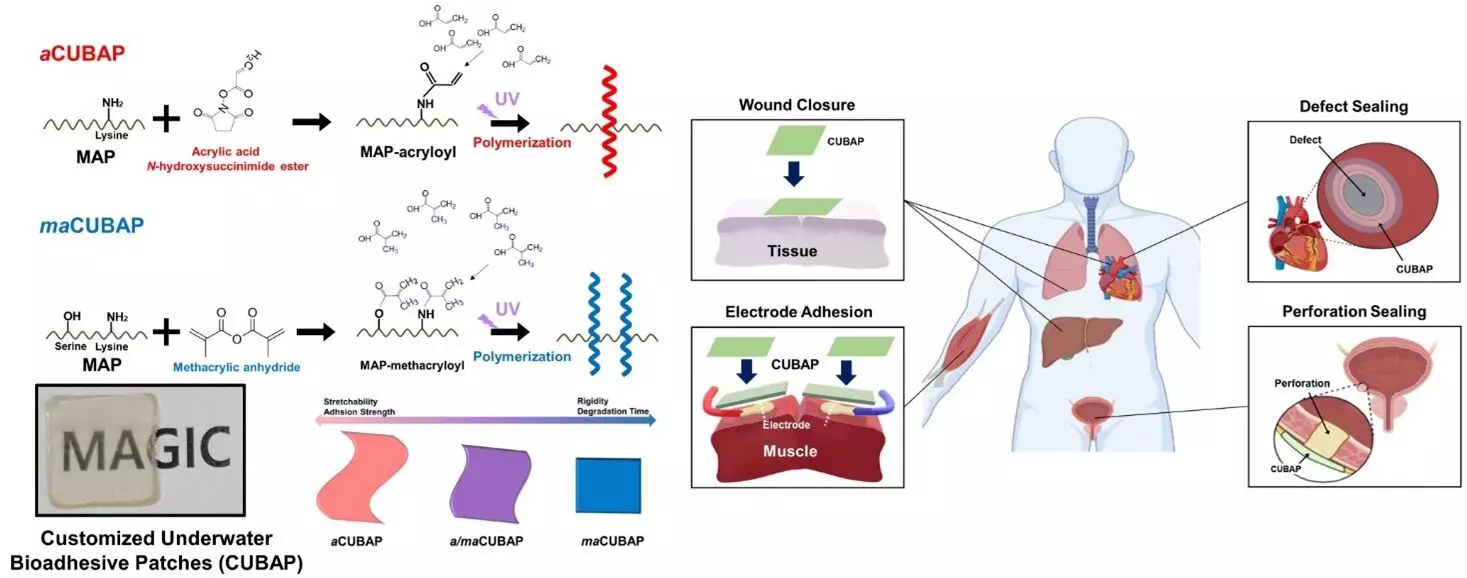The field of adhesives is constantly evolving, with applications ranging from everyday uses to specialized industries such as woodworking. In the medical field, adhesives play a critical role in various applications, from suturing wounds to attaching medical devices. A recent breakthrough in this field has created a stir of excitement – the development of medical adhesives that are not only safe for human use but also customizable for different organs.
Professor Hyung Joon Cha from Pohang University of Science and Technology (POSTECH) and his research team have gained attention for their groundbreaking work in developing customized underwater bio-adhesive patches (CUBAP) using mussel-derived adhesive proteins. These patches are designed to effectively seal internal wounds, leaks, and perforations in the body’s organs, promoting healing and tissue regeneration.
As the field of internal transplant devices expands, there is an increasing demand for adhesives that can securely hold these devices in place. Biomedical adhesives used in such applications must maintain strong adhesion underwater while minimizing potential side effects. Additionally, the ability to customize features like biodegradation time is crucial, considering the unique biological environments of various organs.
Professor Cha’s research team, known for their pioneering work with mussel adhesive proteins, has taken a significant step forward with the development of CUBAP. This adhesive not only exhibits exceptional underwater adhesion but is also made from natural materials, ensuring safety and biocompatibility within the human body.
The team has successfully created customized patches by combining mussel adhesive protein with polyacrylic acid and polymethacrylic acid, which are currently undergoing clinical evaluation for minimizing scarring in skin closures. While the patch remains non-adhesive in its dry state, it exhibits strong adhesive properties in the human body or other humid environments. Moreover, researchers can control the degradation time and mechanical hardness by adjusting the ratios of polyacrylic acid and polymethacrylic acid, making it a truly customizable adhesive system that caters to the unique needs of different organs.
The research team tested three types of customized adhesive patches in animal treatments and implants. These patches demonstrated high adhesion even in highly mobile organs like the heart and bladder. Additionally, successful experiments were conducted in adjusting biodegradation times and flexibility during the transplantation of muscle regeneration electronic devices.
According to Professor Cha, this research opens up possibilities for personalized medical applications. The team aims to further enhance and refine the process through subsequent studies, with the ultimate goal of effectively applying the CUBAP technology in diverse biomedical fields.
Senior Researcher Hwa Hui Shin from K-MEDI Hub expressed their confidence in the effectiveness and versatility of the developed bio-adhesive patches. The study’s findings have validated the potential of these patches in revolutionizing the medical adhesive industry.
Advancements in medical adhesives have the potential to revolutionize the way we treat internal wounds and attach medical devices. The development of customizable underwater bio-adhesive patches marks a significant breakthrough in the field, offering enhanced adhesion, safety, and biocompatibility. As research continues, we can expect to see further refinements and applications in various biomedical fields, bringing us closer to personalized and effective medical treatments.


Leave a Reply